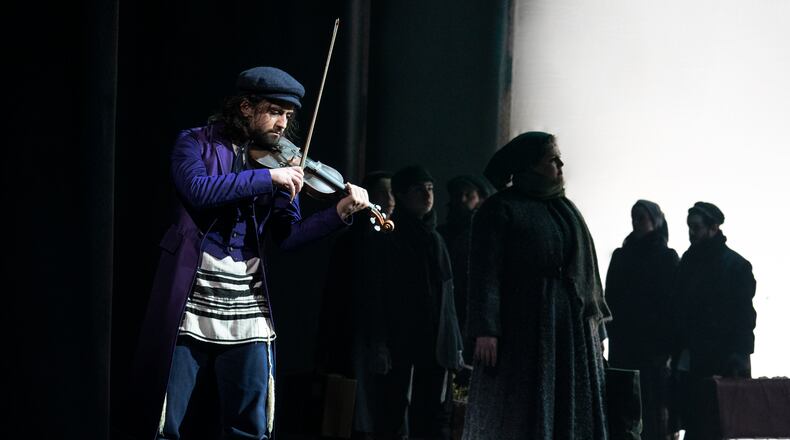What’s a father to do?
It’s the central question in one of Broadway’s most beloved musicals. The national touring company of “Fiddler on the Roof” comes to the Schuster Center June 21-26 as part of Premiere Health’s Broadway in Dayton series. Since it first opened on Broadway in 1964, the show has consistently been on stages throughout the world, including in schools, army bases and summer camps. The original Broadway show won 10 Tony Awards including a special Tony for becoming the longest-running Broadway musical of all time.
The current production, directed by Bartlett Sher, preserves the show’s integrity and the vision of creators Joseph Stein, Jerry Bock and Sheldon Harnick. But it also gives the theater classic a fresh look with new touches.
CCM grad in the cast
When Alex Stone tells people he’s in the national tour of a Broadway show, they’re pretty impressed. When he tells them that the show is “Fiddler,” they often burst into song with “Matchmaker, Matchmaker,” ``Sunrise, Sunset” or “If I Were a Rich Man.”
Stone portrays Sasha, a not-so-nice Russian friend of the young man who courts one of Tevye’s daughters.
Stone, 25, is a graduate of the University of Cincinnati’s prestigious College Conservatory of Music where his favorite role was Quasimodo in “The Hunchback of Notre Dame.” He says CCM has a reputation for being a true triple threat– teaching students to be proficient in dancing, acting and singing and able to make a living in the theater.
“It fundamentally changed my view of acting,” he says about his CCM years. “It’s less of a sense of just playing a character on stage and more a sense of viewing everyone else on stage. You’re creating a whole world.”
The “world” he is helping to create in “Fiddler” is the small Jewish village of Anatevka, in which Jews like Tevye are being persecuted by the Russians and will ultimately be forced out of their homes and villages.
Stone says sometimes it’s difficult to be the villain on stage, a character that feels superior, takes and does what he wants. “He’s very selfish and there are days I don’t like doing what I have to do like destroying a wedding and taking people out of their homes at gunpoint. That’s especially difficult these days because it’s too close to what is going on in the Ukraine.”
The CCM grad especially loves the choreography based on the original staging by Jerome Robbins and the work of Israeli choreographer Hofesh Shechter. “It comes from real authentic places and It’s the most heart and soul of choreography I’ve ever been a part of,” notes Stone. “It doesn’t look like it’s fully choreographed, it feels like people are celebrating and dancing for the love of dancing.”
Stone says the show is really about family so we can all relate. “It’s what you do for your family and what you have to sacrifice for the ones you love. And it’s also about tradition–the values you hold that your ancestors have passed down to you, how you practice those and how modern ways may conflict with those traditions and what you do in that situation. That’s what Tevye has to do.”
Why we love “Fiddler”
Los Angeles journalist Barbara Isenberg had the pleasure of interviewing everyone who worked on both the original Broadway production and the film version of “Fiddler.” The award-winning journalist has been writing and lecturing about theater for more than three decades.
Her book is entitled “Tradition! The Highly Improbable, Ultimately Triumphant Broadway-to-Hollywood Story of Fiddler on the Roof, The World’s Most Beloved Musical.” Among those she interviewed were Harold Prince, Sheldon Harnick, Joseph Stein, Jerry Bock, Austin Pendleton, Joanna Merlin, Norman Jewison, Chaim Topol, Harvey Fierstein and others.
“What attracted me to ‘Fiddler’ is the same thing that attracts everyone else,” says Isenberg. “It’s got great songs, it’s got a great plot, it has a story packed with relevance and timelessness and heart.”
And it’s not just a Jewish story. “‘Fiddler’ is probably the most popular musical to play Japan,” says Isenberg. " The librettist, Joseph Stein, always talked about his experience when he first went to Japan for the show’s first Asian production and the Japanese producer said to him: ‘Do they understand this show in America?’” Isenberg says Stein told her that when he replied “Why do you ask?’ the producer said ``because it’s so Japanese!”
What first intrigued Isenberg about the plot was that it dealt with topics that matter.
“It has a story of people who survived and strong themes of family, tradition, prejudice, immigration and the conflict between generations,” she says.
The creators of the show started writing it in 1961 and it opened in 1964, only two decades after the Holocaust. The current production–with its new opening and close– draws parallels between the classic story and the headlines of today.
One California producer told Isenberg he’d done 15 Fiddler productions over the years and always asked his cast to turn on their TVs at home because there were always oppressors and oppressed people in the news. “Every time I do ‘Fiddler on the Roof’ it coincides with something going on in the world,” he told her. “People losing their rights and losing their homes. That’s what makes it timeless.”
Isenberg says the well crafted book and the memorable songs certainly don’t hurt. “But it also has a plot with something for everyone….the importance of family , friction between generations or the difficult choices that accompany immigration and assimilation.”
HOW TO GO:
What: The national tour of “Fiddler on the Roof,” part of Premiere Health’s Broadway in Dayton series.
Where: Schuster Center, 1 West Second Street, Dayton
When: Tuesday, June 21 through Sunday, June 26.
Tickets: $26-109 at DaytonLive.org or call 937-228-3630.
Related programming: An hour before each performance you can learn more about the history of the show by attending Background on Broadway on the fourth floor of the Schuster’s Wintergarden.
For more information: daytonlive.org/fiddler-on-the-roof
About the Author






